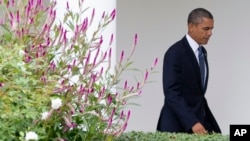NEW YORK —
U.S. President Barack Obama and Iran's President Hassan Rouhani did not meet on the sidelines of the U.N. General Assembly despite conciliatory signals sent by President Rouhani that had increased hopes that he and Obama might find a moment to shake hands in New York.
A senior administration official said there was never any plan for a formal bilateral meeting, but the official also said the U.S. did indicate to the Iranian side that a discussion was possible on the margins of the General Assembly "if the opportunity presented itself."
The official said the Iranian response indicated that "it was too complicated for them to do that at this time, given their own dynamic back home."
Not surprisingly, in their speeches to the General Assembly, neither President Rouhani nor President Obama mentioned anything about this delicate behind-the-scenes back and forth.
Rouhani repeated his call for "constructive engagement," and said that nuclear weapons and other weapons of mass destruction have no place in Iran's security and defense doctrine.
"Our national interests make it imperative that we remove any and all reasonable concerns about Iran's peaceful nuclear program,” said Rouhani.
At the same time, Rouhani said Iran hopes that interactions on Iran's nuclear program refrain from what he called the "short-sighted interests of warmongering." He mentioned in particular the U.S. position that the military option remains on the table if diplomacy fails.
In his address to the assembly, President Obama stressed the importance of Iran turning words into actions that are "transparent and verifiable."
"While the status quo will only deepen Iran’s isolation, Iran’s genuine commitment to go down a different path will be good for the region and the world," said Obama.
The senior U.S. administration official said the real work with Iran will take place in "substantive negotiations," and repeated that Iran's conciliatory signals are due to pressure that sanctions have imposed on its economy.
What is important here is the process, the official said, noting that Iran and the P5+1 group of nations will hold talks in New York, although there is no expectation of any agreement to arise from those talks.
The official was asked about President Rouhani's criticism of President Obama's pledge not to remove military options from the table.
The U.S. remains determined to prevent Iran from getting a nuclear weapon, the official said, but has a preference for diplomacy, adding that the U.S. is not going to change its policy "simply because there is a new leader in Iran."
President Obama was not disappointed with the lack of face-to-face contact with President Rouhani, the senior administration official said, who added that Obama had always said he was willing to meet Iran's leadership and tha tit remains important to continue sending the signal that the U.S. is open to negotiations on the Iran nuclear issue.
A senior administration official said there was never any plan for a formal bilateral meeting, but the official also said the U.S. did indicate to the Iranian side that a discussion was possible on the margins of the General Assembly "if the opportunity presented itself."
The official said the Iranian response indicated that "it was too complicated for them to do that at this time, given their own dynamic back home."
Not surprisingly, in their speeches to the General Assembly, neither President Rouhani nor President Obama mentioned anything about this delicate behind-the-scenes back and forth.
Rouhani repeated his call for "constructive engagement," and said that nuclear weapons and other weapons of mass destruction have no place in Iran's security and defense doctrine.
"Our national interests make it imperative that we remove any and all reasonable concerns about Iran's peaceful nuclear program,” said Rouhani.
At the same time, Rouhani said Iran hopes that interactions on Iran's nuclear program refrain from what he called the "short-sighted interests of warmongering." He mentioned in particular the U.S. position that the military option remains on the table if diplomacy fails.
In his address to the assembly, President Obama stressed the importance of Iran turning words into actions that are "transparent and verifiable."
"While the status quo will only deepen Iran’s isolation, Iran’s genuine commitment to go down a different path will be good for the region and the world," said Obama.
The senior U.S. administration official said the real work with Iran will take place in "substantive negotiations," and repeated that Iran's conciliatory signals are due to pressure that sanctions have imposed on its economy.
What is important here is the process, the official said, noting that Iran and the P5+1 group of nations will hold talks in New York, although there is no expectation of any agreement to arise from those talks.
The official was asked about President Rouhani's criticism of President Obama's pledge not to remove military options from the table.
The U.S. remains determined to prevent Iran from getting a nuclear weapon, the official said, but has a preference for diplomacy, adding that the U.S. is not going to change its policy "simply because there is a new leader in Iran."
President Obama was not disappointed with the lack of face-to-face contact with President Rouhani, the senior administration official said, who added that Obama had always said he was willing to meet Iran's leadership and tha tit remains important to continue sending the signal that the U.S. is open to negotiations on the Iran nuclear issue.





